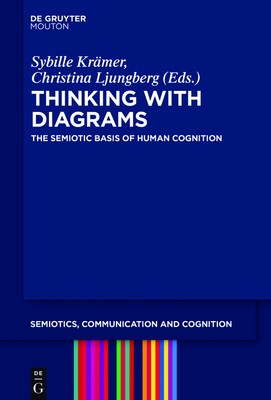
- We will send in 10–14 business days.
- Publisher: Walter de Gruyter
- ISBN-10: 1501511696
- ISBN-13: 9781501511691
- Format: 16 x 23.4 x 1.8 cm, hardcover
- Language: English
- SAVE -10% with code: EXTRA
Thinking with Diagrams (e-book) (used book) | bookbook.eu
Reviews
Description
Diagrammatic reasoning is crucial for human cognition. It is hard to think of any forms of science or knowledge without the "intermediary world" of diagrams and diagrammatic representation in thought experiments and/or processes, manifested in forms as divers as notes, tables, schemata, graphs, drawings and maps. Despite their phenomenological and structural-functional differences, these forms of representation share a number of important attributes and epistemic functions. Combining aspects of linguistic and pictorial symbolism, diagrams go beyond the traditional distinction between language and image. They do not only represent, yet intervene in what is represented. Their spatiality, materiality and operativity establish a dynamic tool to exteriorize thinking, thus contributing to the idea of the extended mind. They foster imagination and problem solving, facilitate orientation in knowledge spaces and the discovery of unsuspected relationships.
How can the diagrammatic nature of cognitive and knowledge practices be theorized historically as well as systematically? This is what this volume explores by investigating the semiotic dimension of diagrams as to knowledge, information and reasoning, e.g., the 'thing-ness' of diagrams in the history of art, the range of diagrammatic reasoning in logic, mathematics, philosophy and the sciences in general, including the knowledge function of maps.
EXTRA 10 % discount with code: EXTRA
The promotion ends in 20d.07:17:16
The discount code is valid when purchasing from 10 €. Discounts do not stack.
- Publisher: Walter de Gruyter
- ISBN-10: 1501511696
- ISBN-13: 9781501511691
- Format: 16 x 23.4 x 1.8 cm, hardcover
- Language: English English
Diagrammatic reasoning is crucial for human cognition. It is hard to think of any forms of science or knowledge without the "intermediary world" of diagrams and diagrammatic representation in thought experiments and/or processes, manifested in forms as divers as notes, tables, schemata, graphs, drawings and maps. Despite their phenomenological and structural-functional differences, these forms of representation share a number of important attributes and epistemic functions. Combining aspects of linguistic and pictorial symbolism, diagrams go beyond the traditional distinction between language and image. They do not only represent, yet intervene in what is represented. Their spatiality, materiality and operativity establish a dynamic tool to exteriorize thinking, thus contributing to the idea of the extended mind. They foster imagination and problem solving, facilitate orientation in knowledge spaces and the discovery of unsuspected relationships.
How can the diagrammatic nature of cognitive and knowledge practices be theorized historically as well as systematically? This is what this volume explores by investigating the semiotic dimension of diagrams as to knowledge, information and reasoning, e.g., the 'thing-ness' of diagrams in the history of art, the range of diagrammatic reasoning in logic, mathematics, philosophy and the sciences in general, including the knowledge function of maps.


Reviews